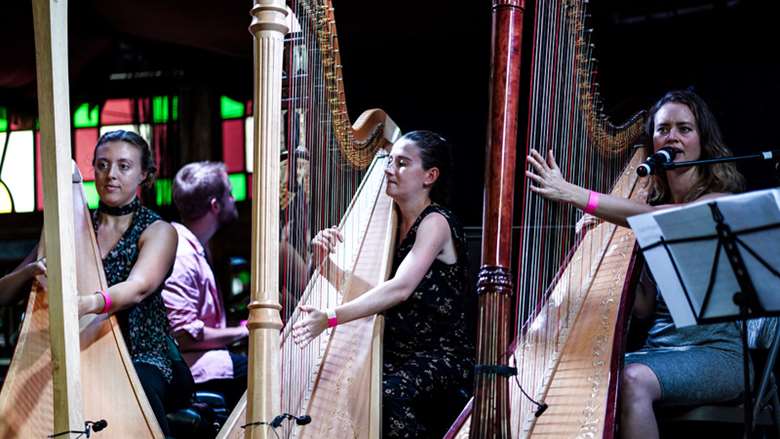Esther Swift fleet of folk at Manchester Jazz Fest
Monday, August 6, 2018
The 'MJF originals' are a lifeline to artistry, like most music festival commissions, and this year they handed the chance to Esther Swift (pictured far right) to entwine her folk, classical and jazz roots with a statement ensemble of strings, brass, piano, drums and four harps.

A rare sight that immediately engaged. Throughout, the delicacy and sweetness associated with harps had an edge created by short repetitive refrains, the four in precise unison. Sometimes their physical scraping of the strings or clawing was a like a dance, the effect mesmerising, and the quality of vibration was, well, heavenly. Cannily, Esther, had piano, sax and trombone to bring earthly dimensions, though the latter was often played with supreme delicacy, as were the drums; there and not there, uniting the sound without dominating it.
The trio of violin, viola and cello added stretches of bowing and energy or heightened the emotion. This was Esther's skill, to imagine such a combination of instruments, allowing each to shine in its own style, then transitioning to a different viewpoint. The sax would walk a line talking to itself, or the trombone would have a deep and dirty blow, then the harps would sparkle alone, switching the mood. The changes were smooth like low, soft waves pulling in, then fading out. Esther's seven-movement work blossomed out of poetry by fellow Scot, Carol Ann Duffy, whose DNA seems to spiral together magical star-spray and concrete realness. Duffy's words from poems such as 'Art' sounded best when Esther speak-sings with a 'Björk-ian' clarity; her high-pitched vocals annunciated the sentiments of the 'Light Gatherer' perfectly. And she had a very warm standing ovation for her efforts.
I was part of a panel discussion afterwards when Esther spoke of her ensemble's unwavering support in this project, and the issues facing female composers. Chaired by Vanessa Reed of the PRS Foundation, the central topic was their Keychange initiative that asks festivals to programme an equal male/female split of band leaders by 2022. Manchester Jazz Festival has signed up and there were seemed plenty of chances to check female talent this year.
I know vocalist Elina Duni well, and was keen to hear her new duo with guitarist Rob Luft. Born in Albania and singing in public since she was about five years old, it's Duni's arrangement of songs that sets her apart, whether it's a traditional such as 'Vaj Si Kenka' or Serge Gainsbourg's 'Couleur Café'. She has a jazz sensibility infused in her delivery, sometimes she'll even use rhythmical scatting, but then she will hold a high porcelain-like note, that seems to stop time; a cry that feels ancient and completely relevant in the same moment. Luft's electric-guitar style and looping suits it well, shimmering and delicate, extending the sentiment of songs such as the Celtic 'The Water is Wide' and I particularly liked their version of 'Wayfaring Stranger', well known as a Johnny Cash track. Duni's intonation on the lyric: "I'm going there to see my Father" was a beautiful balance of heartache and assertion. Whatever the language, a Portuguese fado or Baltic folk, there is a deliciousness to Duni's singing of words and use of accents. There was much light in the performance, and in the setting of St Ann's Church, even in the sadness there was a sense of romance. As Elina explained, Baltic songs express joy and pain, side by side, and the mournful notes led into a rhythmic groove and warmth that she has established with Luft.
Luft also appeared with his band Big Bad Wolf on the festival square's stage. They take indie, pop rock and a touch of jazz, melting them in a tasty toastie that would be welcome at any festival. There is a vulnerability to their sound, especially when Owen Dawson sings or plays a melodic bar on his trombone, as on their new track 'Butterfly'. Luft and bassist Michael de Souza also deliver vocals with a gentle, uncertain tone but, like drummer Jay Davis, they all play with great ability and unity, creating a place for themselves that feels sort of fresh, and avoids horrible jazz clichés altogether.
On the same stage, Umbra from Dublin conveyed the rock influences that guitarist Chris Guilfoyle picked up journeying the west coast of America and Canada. Set in a more obvious jazz context, drummer Matt Jacobsen was able to address any style asked of him, while there was animated interplay between saxophonists Sam Comerford and Chris Engel. The latter, originally from Cape Town, stabbed out one solo with great verve and heat.
– Debra Richards
– Photo by Manc Wanderer